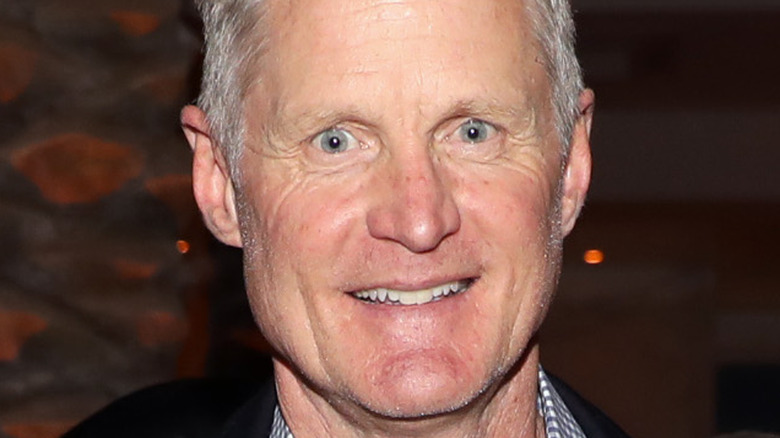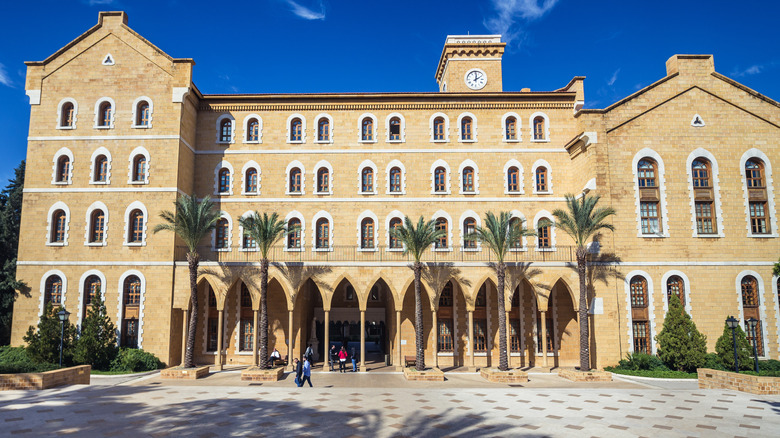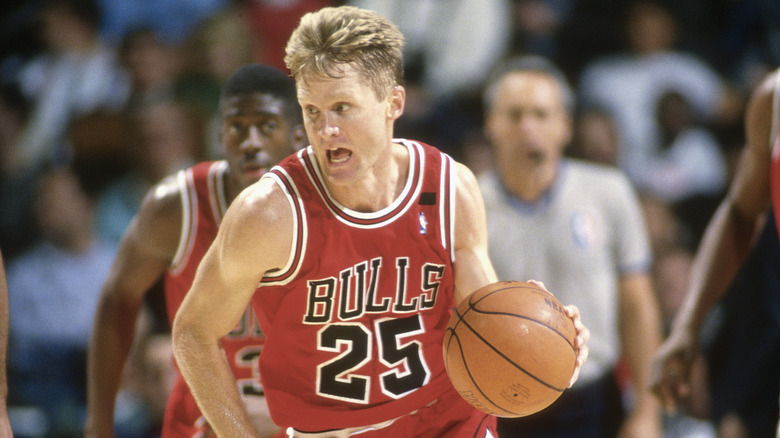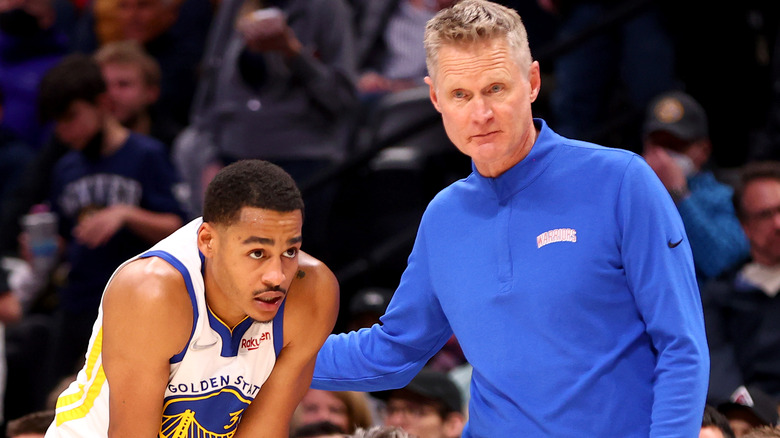The Former Bulls Star Who Lost His Father In A Terrorist Attack
Steve Kerr has had a long and impressive career in basketball. From his days on the University of Arizona's varsity squad in the 1980s (per Sports Reference), to playing for the Chicago Bulls during their second round of three back-to-back NBA Championships in 1996, 1997, and 1998, to his current position as Head Coach of three-time NBA Championship-winning Golden State Warriors (winning in 2015, 2017, and 2018, and another trip to the finals in 2022, per Basketball Reference), he has contributed in myriad ways to the excellence and prestige of the sport.
Each of those accomplishments is impressive on its own. Taken together, they're extraordinary. As noted by USA Today, the fact that Kerr played so well at the Division I collegiate level in the immediate aftermath of his father's 1984 assassination in Beirut, Lebanon, lends a deeply poignant element to a career that was just beginning to take off when tragedy struck his family.
Born in 1965 in Beirut, Steve Kerr is the third of four children in a family of academics. His parents, Malcolm Kerr and Ann Zwicker Kerr, had met at the American University of Beirut in 1954 (via The New Yorker). Steve grew up as a global citizen, attending international schools in Beirut and Cairo during his father's international teaching positions over the years, and returning to Los Angeles during high school so he could pursue basketball more seriously.
The assassination of Steve Kerr's father, Middle East scholar Malcolm Kerr
After teaching political science and working as an administrator at the University of California at Los Angeles for 20 years, Malcolm Kerr accepted the position of president of the American University of Beirut in 1982 (as reported in his New York Times obituary). As his wife, Ann, noted in her biographical sketch of her late husband for the Middle East Studies Association (MESA), this was the crowning accomplishment of a distinguished career, and since Steve was soon to enroll and play basketball at the University of Arizona, it was a reasonable time for Professor Kerr to take the job, even though it meant relocating from Southern California to Lebanon.
According to Britannica, since 1975 Lebanon had been mired in a civil war with both formal and informal combatants, so the Kerrs — who were scholars of Middle Eastern history and politics — were well aware that the danger of politicized violence would be ever present. However, Dr. Kerr felt equal to the task of navigating those complexities, quipping in an interview quoted in his obituary that "Beirut is as safe as New York, Chicago, Los Angeles," though as Ann rejoined, "I know. That isn't saying much." On January 18, 1984, Malcolm Kerr was killed by two gunshots to the head as he approached his office. Islamic Jihad later took responsibility for the assassination (per MESA).
How Steve Kerr processed his father's death
At the time of his father's assassination, Steve Kerr was an 18-year-old freshman at the University of Arizona. According to a blog posted by The San Jose Mercury News, upon receiving a call informing him that his father had been the victim of a targeted and fatal ambush, he ran outside into the streets of Tuscon to get his bearings.
Bruce Fraser, a longtime friend and current assistant at Golden State, later told USA Today, "I think the death of his father helped Steve as a basketball player, because he realized it was just basketball. He was more worldly than most of us already because of his background, but this changed his whole outlook." Fraser also remarked that the rage caused by Kerr's grief at a particularly formative age also fed his teammate's competitiveness; shortly after his father's death, he practiced with the team as usual and delivered his best performance of the season against Arizona State, scoring on five of his seven attempted shots of the game. "He was just so f—— angry. But that was Steve. He could turn it toward the court and win."
As a fifth-year senior, Kerr led the Arizona Wildcats to the NCAA Tournament's Final Four in 1988 (per NCAA). Fraser told USA Today that following Malcolm Kerr's assassination, Steve Kerr "turn[ed] to the team as family. He became really vested in the players there and what [Coach] Lute was trying to do."
An NBA career for the ages
After graduating from the University of Arizona, Steve Kerr was selected by the Phoenix Suns in the second round of the 1988 NBA draft (per Basketball Reference). After spending the first five years of his NBA career with the Suns, Cleveland Cavaliers, and Orlando Magic, Kerr was traded to the Chicago Bulls in 1993.
Over the course of five seasons with the Bulls, Steve Kerr was a member of the unstoppable squads that won three consecutive NBA Championships (1996, 1997, and 1998), the team's second three-peat in that decade. In the last game of the 1997 finals, he made the tournament-winning shot off of a pass from Michael Jordan. Kerr went on to win two more championships playing for the San Antonio Spurs (1999 and 2003), bringing his collection of championship rings earned as a player up to five over a 15-year career.
In addition to winning five NBA Championships as a player, Kerr also won the 1997 NBA Three-Point contest. As a coach, he has led the Golden State Warriors to three NBA Championships to date (2015, 2017, and 2018), has been honored by the NBA as Coach of the Year in 2016 (per ESPN), served as Western Conference coach in the 2015 and 2017 All-Star Games, and was named among the Top 15 Coaches in NBA History as part of the Association's 75th Anniversary celebrations in 2022 (per NBA).
Steve Kerr's post-player career
Between his successful stints playing and coaching professional basketball, Steve Kerr continued working in and around the NBA. He was an analyst and commentator for the long-running show NBA on TNT from 2003-2006, and again from 2010-2014 (via SportsMediaWatch). In 2004, Kerr accepted a minority ownership of the team that originally drafted him, the Phoenix Suns, and in the process became a consultant for the team (via SFGate). In 2007, he became the Suns' general manager (per Basketball Reference), staying with the team until 2010. In his 2019 interview with SFGate, Kerr acknowledged that being general manager was a serious challenge for him, and that coaching is a far better fit.
Leveraging his platform as a public figure on Twitter and in team press conferences following all-too-frequent mass shootings, Steve Kerr often calls on lawmakers to pass more stringent gun control legislation (per The Mercury News). In spite of promoting general public awareness of the issue, Kerr's pleas have not had their desired result. Unsurprisingly, gun violence is an issue that hits close to home for him. Following the 2016 Pulse Nightclub mass shooting in Orlando, Florida, he remarked to The New Yorker, "You understand how much they are suffering, just like how our family went through that suffering. When you think of it, all of these statistics have names and these names have faces. They are people who are now lost."




